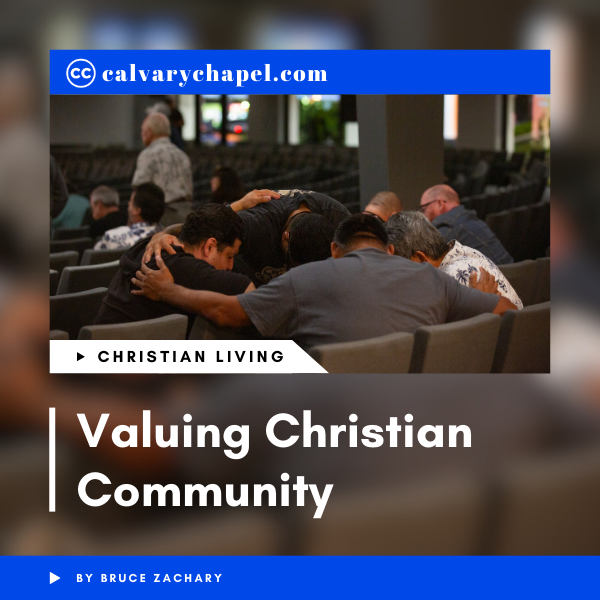
Valuing, gerund or present participle
Consider (someone or something) to be important or beneficial; have a high opinion of . . .
Undoubtedly, Jesus’ followers (disciples generally) and spiritual leaders (e.g., pastors) affirm they value Christian community. Nevertheless, do our actions affirm the value of valuing community? It is easy to know the price of something, but to perceive value is a nuanced endeavor reflecting true wisdom.
A survey by Lifeway Research (conducted August 14-30, 2024) of evangelical churches in the United States reports that 75 percent of pastors identified apathy or lack of commitment as a significant concern. Prior to the COVID pandemic, 87 percent of evangelicals attended services in-person regularly; presently, only 54 percent do. It should be noted that “regularly” is 1 to 3 times a month. Thus, 46 percent of protestant congregants are attending in-person less than once a month. The decline in in-person attendance, and corresponding increase in online viewing, has resulted in a reduced sense of community and accountability. The implications should raise concerns among not only pastors but all who identify as Jesus’ followers.
Why gather together? In a culture characterized by rugged independence and individualism, is the pursuit of Christian community vital and necessary to emotional and spiritual health? The writer of Hebrews reveals that the pursuit of Christian community is the right and reasonable response to what Jesus has done for us (Heb. 10:5-19) and is necessary for emotional and spiritual health for the individual and the community:
“And let us consider one another in order to stir up love and good works, not forsaking the assembling of ourselves together, as is the manner of some, but exhorting one another, and so much the more as you see the Day approaching” (Heb. 10:24-25).
So, what are some of the benefits of Christian community?
1. Christian community is an antidote to discouragement.
The recipients of the letter were avoiding community when they needed it the most. They were shaken in the midst of a culture that was contrary to a Christian worldview. The antidote for the discouragement that kept them from pursuing community was to pursue Christian community. Discouragement would give way to encouragement in the context of Christian community. As followers of Jesus, we are a family. As a network of Calvary Chapel and like-minded evangelical churches, we are a family. The metaphor of family is intentional and implies interdependence. So, if you are feeling discouraged, the antidote is Christian community (and to those who are not discouraged, the answer is Christian community). How do we move from discouraged to encouraged, valued, and content? Contrary to Ian Fleming’s fictional British Secret Service agent, James Bond, our preference is stirred, not shaken.
2. Stir and be stirred.
Let us consider one another is the move from “me-centered” to “others-centered” living. People are selfish by nature, and we spend an inordinate amount of time and energy contemplating our interests and desires and wondering what others think of us (How many likes? How many followers?). In the dichotomy between good and evil, self-centeredness clearly leans toward evil and is contrary to Christ-likeness. We need to be “others-centered” in order to stir up love and good works.
We need to stir and be stirred to love. While faith and hope can be individual endeavors, love needs to be experienced in community. Christlike love (agape) is unconditional, unmerited, sacrificial, and committed. The aim of Christian community, unlike any other community, is to stir others, and be stirred by others, to Christlike love. The value of Christlike love is linked to good works. Just as the greatest commandment, to love God with all your heart, mind, soul, and strength, cannot be unlinked from the command to love neighbors as self (Deut. 6:4-5, Matt. 22:37-39), the stirring of love is evidenced by good works. We are to stir and be stirred to pure and beautiful service to God by serving others.
In our local church, we recently gathered for a volunteer appreciation dinner. During the evening, I asked a few simple questions to a room of more than 100 participants. How many of you feel that you grew in love for God by serving others? How many of you feel that you grew in love for others by serving this last year? How many of you feel that you grew in your faith by serving this last year? With each question asked, the crowd unanimously and without hesitation raised hands. Thus, the value of stir and be stirred.
3. Showing up and growing up.
We are to live with an awareness of the imminent return of Christ, the Day approaching. This reality precludes us from isolation as some tend to do (as is the manner of some). Forsaking the assembling of ourselves together is generally inexcusable. The Greek term translated “assembling” implies Christ-centered community. Thus, social gatherings, which are better than isolation for mental and emotional health, do not satisfy the requirement of Christ-centered absent a gospel-centered foundation.
The purpose of these gatherings is to exhort one another. The Greek parakleo, translated exhort, is also translated as: encourage, admonish, console, comfort, strengthen, instruct, and teach. Slowly reread that list. . . . I presume that you agree that all of these actions are attractive and valuable. I know I want to be the recipient of: encouragement, consolation, comfort, strengthening, instruction, teaching, and I likely need a dose of admonishment too. And you and I also know countless people who would like the same.
In essence, the formula is simple: time and consistent showing up results in growing up (better spiritual, emotional, and mental health). The value or benefit is priceless, and the cost relatively inexpensive. Alas, apparently, nearly half of the self-identified Christians do not value Christian community.
These gatherings take many forms, including weekend worship services (aka “church”), mid-week, and ever-important gospel-centered small group settings.
To my fellow disciples, I beseech (Christianese for beg) you to discover the value of Christian community.
To my fellow-pastors and Christian leaders, I urge us to practice what we preach. If we instruct our congregants about the value and importance of Christian community, but do not live the value, we are hypocrites. Spiritual leaders can tend towards isolation because the dynamics of “pastor-penitent” relationships are awkward. Nevertheless, CGN hosts regional Gatherings and an International Conference where the value of Christian community is discovered and experienced by pastors, leaders, and Christ-followers. Simply stated, invest in something valuable—Christian community!








